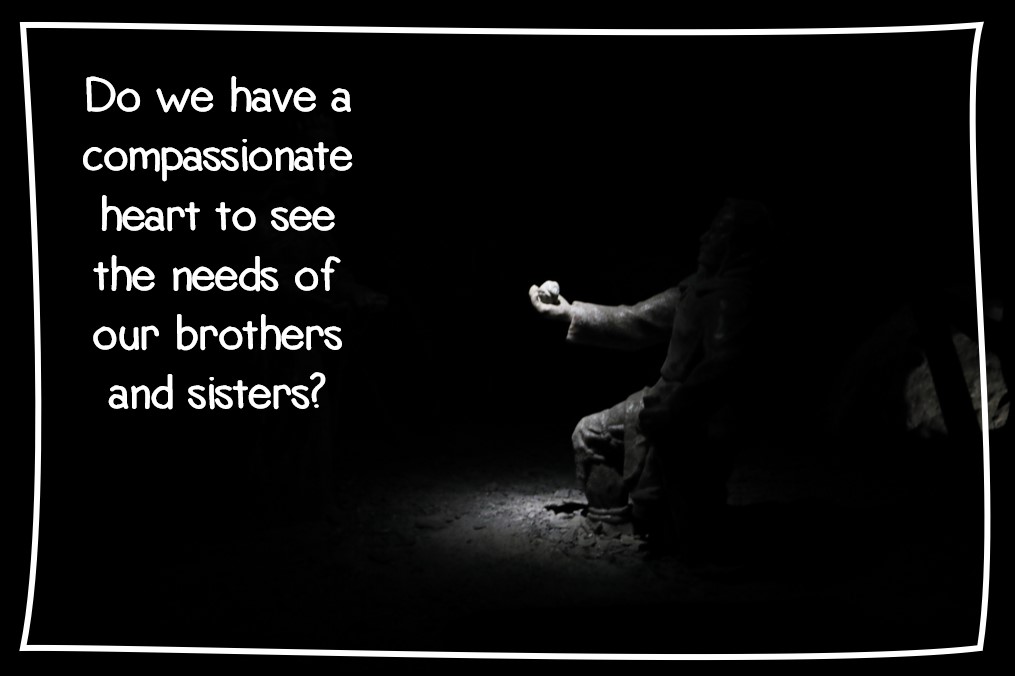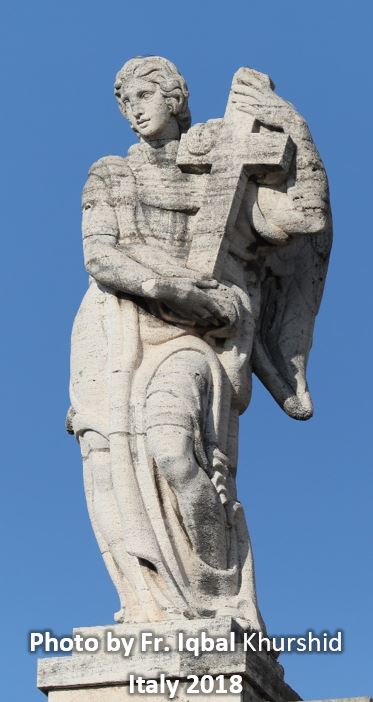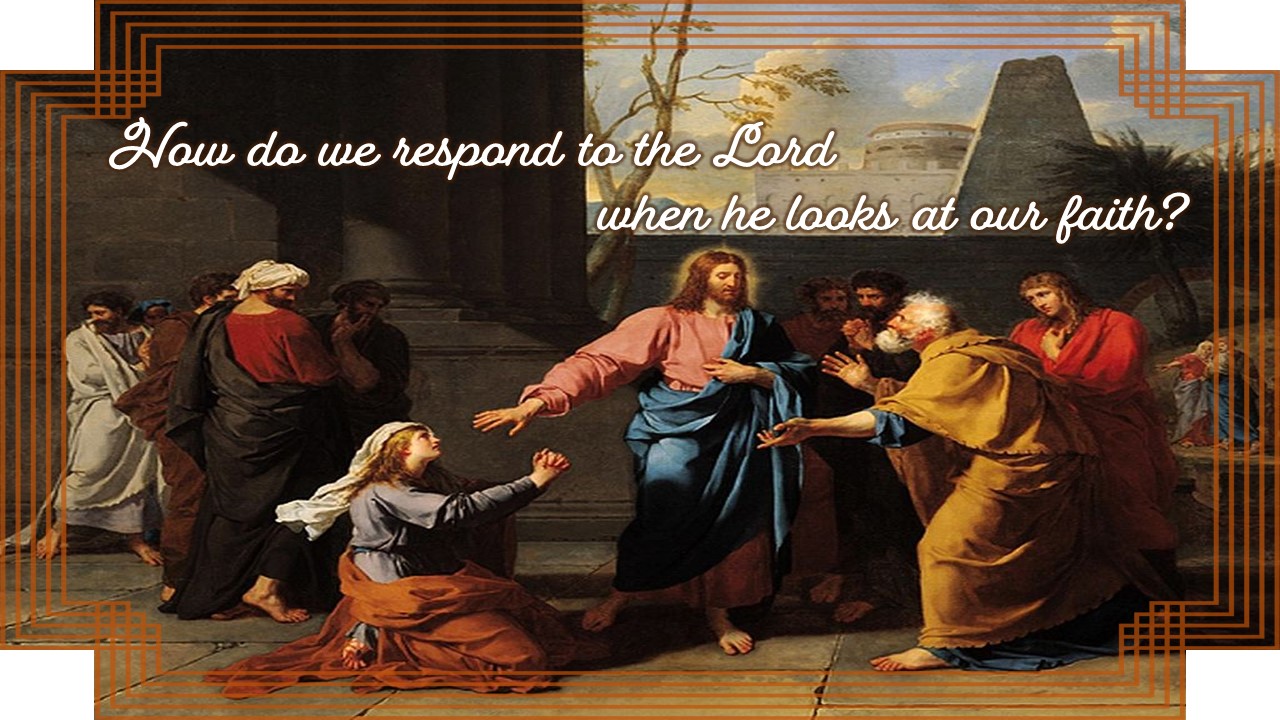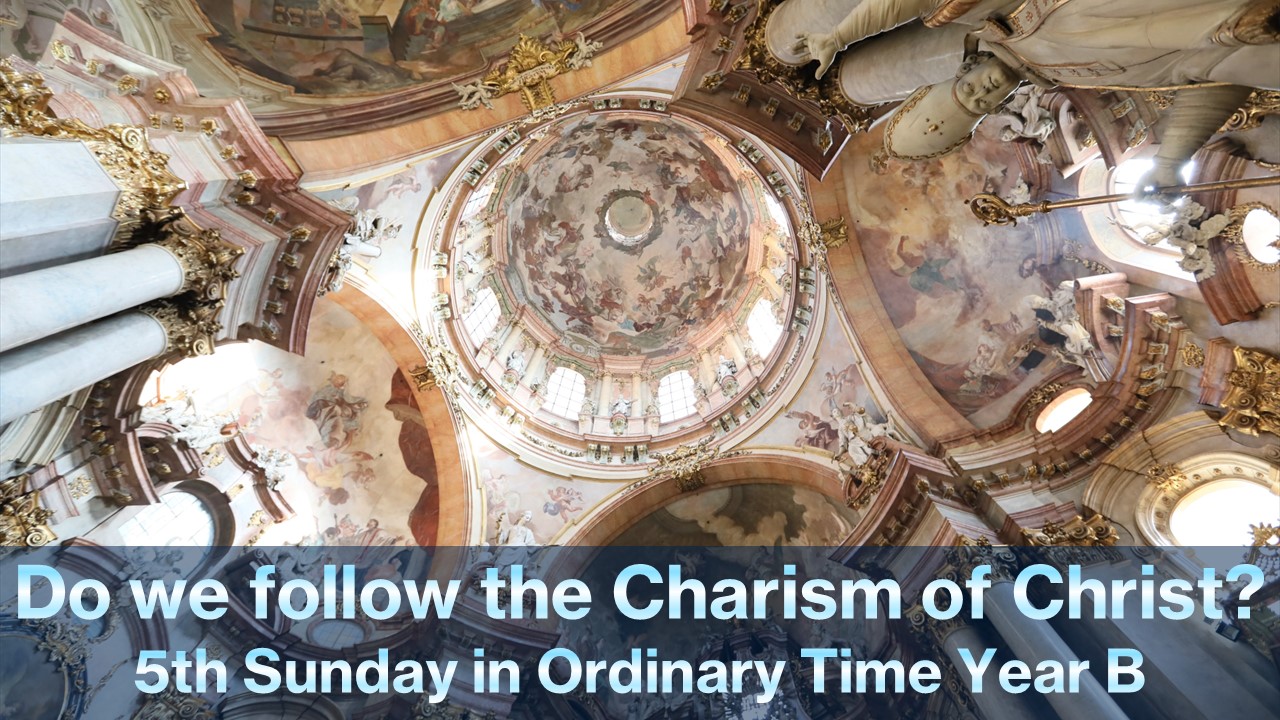
26th Sunday in Ordinary Time Year C ~ September 25, 2022
Compassionate Heart
The world is divided between two types of people: first who have compassion, love and care for other people, and second, those who only care about themselves. The later group has mentality of Stoics & Epicureans who believed in the pursuit of pleasure and the avoidance of pain and pursuing happiness, which they believed was a product of “living in accordance with nature”. Are we not called to care about other people? St. Augustine is right to say when he reflected on the role of shepherds and sheep: ‘The straying sheep you have not recalled; the lost sheep you have not sought. In one way or another, we go on living between the hands of robbers and the teeth of raging wolves, and in light of these present dangers we ask your prayers. The sheep moreover are insolent. The shepherd seeks out the straying sheep, but because they have wandered away and are lost, they say that they are not ours. “Why do you want us? Why do you seek us?” they ask, as if their straying and being lost were not the very reason for our wanting them and seeking them out. “If I am straying,” he says, “if I am lost, why do you want me?” You are straying, that is why I wish to recall you. You have been lost; I wish to find you. “But I wish to stray,” he says: “I wish to be lost.” So, you wish to stray and be lost? How much better that I do not also wish this. Certainly, I dare say, I am unwelcome. But I listen to the Apostle who says: Preach the word; insist upon it, welcome and unwelcome. Welcome to whom? Unwelcome to whom? By all means welcome to those who desire it; unwelcome to those who do not. However unwelcome, I dare to say: “You wish to stray, you wish to be lost; but I do not want this.” For the one whom I fear does not wish this. And should I wish it, consider his words of reproach: The straying sheep you have not recalled; the lost sheep you have not sought. Shall I fear you rather than him? Remember, we must all present ourselves before the judgment seat of Christ”.
He continues to shake everyone who is only concerned about him/herself “I shall recall the straying; I shall seek the lost. Whether they wish it or not, I shall do it. And should the brambles of the forests tear at me when I seek them, I shall force myself through all straits; I shall put down all hedges. So far as the God whom I fear grants me the strength, I shall search everywhere. I shall recall the straying; I shall seek after those on the verge of being lost. If you do not want me to suffer, do not stray, do not become lost. It is enough that I lament your straying and loss. No, I fear that in neglecting you, I shall also kill what is strong. Consider the passage that follows: And what was strong you have destroyed. Should I neglect the straying and lost, the strong one will also take delight in straying and in being lost.
On September 21 we celebrated the Feast of St. Matthew the Evangelist who was a chief tax collector but when he was called to follow the Lord, he left everything and became his disciple. St. Bede the Venerable reflected on the call of St. Matthew in this way “Jesus saw a man called Matthew sitting at the tax office, and he said to him: Follow me. Jesus saw Matthew, not merely in the usual sense, but more significantly with his merciful understanding of men. He saw the tax collector and, because he saw him through the eyes of mercy and chose him, he said to him: Follow me. This following meant imitating the pattern of his life—not just walking after him. Saint John tells us: Whoever says he abides in Christ ought to walk in the same way in which he walked. And he rose and followed him. There is no reason for surprise that the tax collector abandoned earthly wealth as soon as the Lord commanded him. Nor should one be amazed that neglecting his wealth, he joined a band of men whose leader had on Matthew’s assessment, no riches at all. Our Lord summoned Matthew by speaking to him in words. By an invisible, interior impulse flooding his mind with the light of grace, he instructed him to walk in his footsteps. In this way Matthew could understand that Christ, who was summoning him away from earthly possessions, had incorruptible treasures of heaven in his gift.
As he sat at table in the house, behold many tax collectors and sinners came and sat down with Jesus and his disciples. This conversion of one tax collector gave many men, those from his own profession and other sinners, an example of repentance and pardon. Notice also the happy and true anticipation of his future status as apostle and teacher of the nations. No sooner was he converted than Matthew drew after him a whole crowd of sinners along the same road to salvation. He took up his appointed duties while still taking his first steps in the faith, and from that hour he fulfilled his obligation and thus grew in merit. To see a deeper understanding of the great celebration Matthew held at his house, we must realize that he not only gave a banquet for the Lord at his earthly residence, but far more pleasing was the banquet set in his own heart which he provided through faith and love. Our Savior attests to this: Behold I stand at the door and knock; if anyone hears my voice and opens the door, I will come into him and eat with him, and he with me. On hearing Christ’s voice, we open the door to receive him, as it were, when we freely assent to his promptings and when we give ourselves over to doing what must be done. Christ, since he dwells in the hearts of his chosen ones through the grace of his love, enters so that he might eat with us and we with him. He ever refreshes us by the light of his presence insofar as we progress in our devotion to and longing for the things of heaven. He himself is delighted by such a pleasing banquet”.
Jesus is the Lamb of sacrifice who has died once for all to save us (Please read Hebrews 9) because he has carried our iniquities and infirmities onto him as Prophet Isaiah says. The Holy Bible is full of stories about having a compassionate heart to help people in need because we are just made little less than angels as the Psalmist says. I found this very interesting story on the internet by an unknown author, and I do believe this story will help us to understand today’s Sacred Scripture.
I was driving home from a work when my car started to choke and sputter and died.
I barely managed to coast, cruising, into a gas station, glad only that I would not be blocking traffic on the highway and would have a somewhat warm spot to wait for the tow truck. It wouldn’t even turn over. Before I could make the call, I saw a woman walking out of the “quickie mart” building, and it looked like she slipped on some ice and fell into a gas pump! So, I got out to see if she was okay. When I got there, it looked more like she had been overcome by sobs than that she had fallen. She was a young woman who looked really haggard with dark circles under her eyes. She dropped something as I helped her up, and I picked it up to give it to her. It was a nickel.
At that moment, everything came into focus for me: the crying woman, the ancient Suburban crammed full of stuff with 3 kids in the back (1 in a car seat), and the gas pump reading $4.95. I asked her if she was okay and if she needed help, and she just kept saying “I don’t want my kids to see me crying,” so we stood on the other side of the pump from her car. She said she was driving to California and that things were very hard for her right now.
So, I asked, “And you were praying?” That made her back away from me a little, but I assured her I was not a crazy person and said, “He heard you, and He sent me.”
I took out my card and swiped it through the card reader on the pump so she could fill up her car completely, and while it was fueling, walked to the next-door McDonald’s and bought 2 big bags of food, some gift certificates for more, and a big cup of coffee. She gave the food to the kids in the car who attacked it like wolves, and we stood by the pump eating fries and talking a little.
She told me her name and that she lived nearby. Her boyfriend left 2 months ago, and she had not been able to make ends meet. She knew she wouldn’t have money to pay the rent January 1st, and finally, in desperation, had called her parents, with whom she had not spoken in about 5 years. They lived in California and said she could come live with them and try to get on her feet there.
So, she packed up everything she owned in the car. She told the kids they were going to California for Christmas but not that they were going to live there.
I gave her my gloves and a little hug and said a quick prayer with her for safety on the road. As I was walking over to my car, she said, “So, are you like an angel or something?”
This definitely made me cry. I said, “Sweetie, at this time of year, angels are really busy, so sometimes God uses regular people.”
It was so incredible to be a part of someone else’s miracle. And of course, when I got in my car, it started right away and got me home with no problem. I’ll put it in the shop tomorrow for a check, but I suspect the mechanic won’t find anything wrong.
Do we remember the Readings of Last Sunday? If not, then let us refresh our memories. First Reading was taken from Amos who warned the people of Israel to look into the attitude towards poor people and God and don’t focus only on the worldly things as many were buying the poor with silver and a pair of shoes. And the Gospel Reading was about a dishonest manager who was squandering with the property and many of his master. Jesus goes on to teach us how to be shrewd in our building our relationship with God and warned us to chose only Master to Serve because we cannot serve God and wealth.
Today once again we are introduced to a similar attitude of the people who are only concerned about themselves and have no compassion about others. In the First Reading we see once again the attitude of the rich towards poor people; “Woe to the complacent in Zion, to those who feel secure … lying upon beds of ivory!”. They eat, they drink, they sing, they play, and they care nothing about other people’s troubles.” These are harsh words which the prophet Amos speaks, yet they warn us about a danger that all of us face. What is it that this messenger of God denounces; what does he want his contemporaries, and ourselves today, to realize? The danger of complacency, comfort, worldliness in our lifestyles and in our hearts, of making our well-being the most important thing in our lives. Whenever material things, money, worldliness, become the centre of our lives, they take hold of us, they possess us; we lose our very identity as human beings.
Let us try to think: How does something like this happen? How do some people, perhaps ourselves included, end up becoming self-absorbed and finding security in material things which ultimately robs us of our face, our human face? This is what happens when we become complacent when we no longer remember God. “Woe to the complacent in Zion”, says the prophet. If we don’t think about God, everything ends up flat, everything ends up being about “me” and my own comfort. Life, the world, other people, all of these become unreal, they no longer matter, everything boils down to one thing: having. When we no longer remember God, we too become unreal, we too become empty. Those who run after nothing become nothing – as another great prophet Jeremiah, observed (2:5). We are made in God’s image and likeness, not the image and likeness of material objects, of idols!
In the Gospel today we see the story of a rich man robed in purple and a poor man sitting at his door with sore wounds. Is God against the riches? Absolutely not but the uncompassionate heart and selfishness of human. The sin of the rich man in the Gospel is not that he is rich but the sin is that he not does care about other people. This was the case of the rich man in the Gospel, who dressed in fine garments and daily indulged in sumptuous banquets; this was what was important for him. And the poor man at his doorstep had nothing to relieve his hunger! That was none of his business, it didn’t concern him. Think of it: the rich man in the Gospel has no name, he is simply “a rich man”. Material things, his possessions, are his face; he has nothing else. (Please Luke 4:1-13).
In the Gospel, there are two stories of the rich man and of the poor man named Lazarus. In particular, the first story is that of the rich man, who was clothed in purple and the finest linen, who took good care of himself, and feasted sumptuously every day. The text does not say he was bad, but rather that he had a comfortable life, he gave himself a good life. In fact, the Gospel doesn’t say that he overindulged; instead, his was a quiet life, with friends. Who knows, perhaps if he had parents, he surely sent them things so they would have the necessities of life. And maybe he was a religious man, in his way. Perhaps he recited a few prayers; and surely two or three times a year he went to the temple to make sacrifices and gave large offerings to the priests. And they, with their clerical cowardliness, thanked him and made him sit in the place of honour. This was the social lifestyle of the rich man presented by Luke.
Then there is the second story, that of Lazarus, the poor mendicant who lay at the rich man’s gate. How is it possible that this man didn’t realize that Lazarus was there, below his house, poor and starving? The wounds that the Gospel speaks of, are a symbol of the many needs he had. In the final analysis, the rich man wasn’t bad, he was sick: afflicted with worldliness, therefore that worldly man wasn’t able to see reality.
The second story is clear: there are so many people who conduct their lives in a difficult way but if I have a worldly heart, I will never understand this. After all, with a worldly heart it is impossible to comprehend the necessities and needs of others.
These are the two stories presented by the Liturgy. The two judgements, instead, are a curse and a blessing. There are the three names offered in the Gospel Reading: they are that of the poor man, Lazarus, that of Abraham, and that of Moses. Another key to understanding is that the rich man had no name, because the worldly lose their name, which is merely a feature of the well-off crowd who need nothing. On the other hand, there are Abraham, our father; Lazarus, a man who struggles because he is good and poor and has so much pain; and Moses, the man who gives us the law. But “the worldly have no name. They didn’t listen to Moses because they only needed extraordinary manifestations.
Do we have a compassionate heart to see the needs of our brothers and sisters? Are we lost in our worldly pleasures and close our eyes to the realities of the world? Let us remember the words of Abraham in the Gospel today “Remember son, in the world you had everything… and amend our ways of living.
Other Sermons In This Series

6th Sunday in Ordinary Time Year C – February 13, 2022
February 11, 2022

20th Sunday in Ordinary Time- Year A ~ August 20, 2023
August 18, 2023

5th Sunday in Ordinary Time Year B ~ February 4, 2024
February 01, 2024

